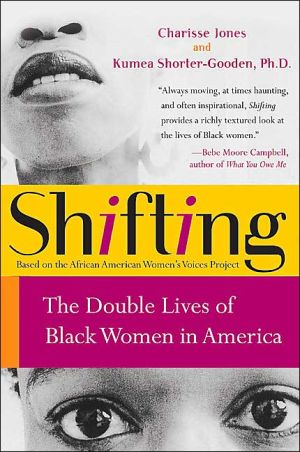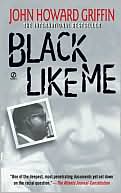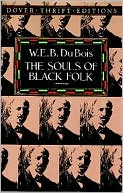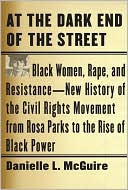Shifting: The Double Lives of Black Women in America
Based on the African American Women's Voices Project, Shifting reveals that a large number of African American women feel pressure to com-promise their true selves as they navigate America's racial and gender bigotry. Black women "shift" by altering the expectations they have for themselves or their outer appearance. They modify their speech. They shift "White" as they head to work in the morning and "Black" as they come back home each night. They shift inward, internalizing the searing pain...
Search in google:
Based on the African American Women's Voices Project, Shifting reveals that a large number of African American women feel pressure to com-promise their true selves as they navigate America's racial and gender bigotry. Black women "shift" by altering the expectations they have for themselves or their outer appearance. They modify their speech. They shift "White" as they head to work in the morning and "Black" as they come back home each night. They shift inward, internalizing the searing pain of the negative stereotypes that they encounter daily. And sometimes they shift by fighting back.With deeply moving interviews, poignantly revealed on each page, Shifting is a much-needed, clear, and comprehensive portrait of the reality of African American women's lives today.Publishers WeeklyUSA Today correspondent Jones and psychologist Shorter-Gooden initiated the African American Women's Voices Project and recorded the experiences of 333 survey respondents and 71 interviewees. The results are here compiled to form an urgent narrative, doggedly chasing the hypothesis of the book's title: that the twin bigotries of race and gender force black women to constantly "shift" between identities in order to accommodate the expectations thrust upon them by black men and white America. "From one moment to the next, they change their outward behavior, attitude, or tone, shifting `white,' then shifting `Black' again, shifting `corporate,' shifting `cool.' " The authors argue that the contemporary survival tactic of shifting is rooted in slavery, but history does not figure strongly, with the bulk of the book composed of quoted testimonies from the research subjects, tracking their shifting experiences in the realms of communication, mental health, beauty standards, romance, child-rearing and religion. Compelling and educational tribulations are piled on, but the authors rarely pause to reflect on the contradictions or solutions the stories present. Yet the book makes a real contribution, as men and women of all races will find it an illuminating if sometimes shocking record of life between two "isms." (Sept. 2) Forecast: Comparable to recent titles like Having It All by Veronica Chambers and Longing to Tell by Tricia Rose, this book should find its way to reading groups, and "shifting" is a ripe coinage for broader journalistic discussions of race and gender. Copyright 2003 Reed Business Information.
Shifting\ The Double Lives of Black Women in America \ Chapter One\ The Roots of Shifting\ \ Black women are seen as "hot in the pants," tough and strong, able to withstand a lot of physical and emotional abuse, unfeeling ... I find this to be demeaning, degrading, and unproven. Yet I find myself constantly trying to disprove them.\ \ Cecilia, 52, Hartford, Connecticut\ The Gifts of Black Women in America\ Black women in America have learned to find humor in heartache, to see beauty in the midst of desperation and horror. They have been both caregivers and breadwinners, showing incredible strength and resilience, unflinching loyalty, boundless love and affection. They have risen above centuries of oppression so that, today, after years of dealing with society's racist and sexist misconceptions, with its brutal hostilities and unthinkable mistreatment, not only are they supporting families, they're leading corporations, major media organizations, the military, our state and federal governments. Black women have often been the champions on our nation's sports teams, breaking Olympic records, guiding the nation to victory. They have assumed a prominent place in the culture of our times both in the United States and abroad, contributing great literature, journalism, music, dance, theater, science. They have etched anew the cultural landscape with their courage and vision. Maya Angelou. Oprah Winfrey. Mae Jemison. Venus Williams. Alfre Woodard. Judith Jamison. Faith Ringgold. Lau, ryn Hill. Ruby Dee. bell hooks. Carol Moseley-Braun. Anna Deavere Smith. Faye Wattleton. Toni Morrison. Johnnetta Cole. Thereare so many brilliantly talented, beautiful, deeply thoughtful and intelligent African American women who are shaping our world today and doing everything possible to make it a richer and better place.\ Black women have so much to offer our country, so many gifts to share with all of us. And yet, as a society and as a nation, we have never quite stopped to appreciate the truth of their experience, the verity of what it feels like to be Black and female, the reality that no matter how intelligent, competent, and dazzling she may be, a Black woman in our country today still cannot count on being understood and embraced by mainstream White America.\ As a society, we know very little about the psychology of Black women, a group of 19 million people -- 7 percent of the U.S. population. The way they experience the workplace, the complexities of their romantic lives, the challenges they face as mothers and grandmothers, their spiritual and religious practices, these and so many other aspects of their lives are largely unknown to the wider community. Being ignored and poorly understood likely explains why so many Black women today still feel profoundly unhappy about their place in society. In a June 2002 Gallup poll, 61 percent of Black women said they were dissatisfied with "how Blacks are treated in society." For Black men, the rate of dissatisfaction was lower -- 47 percent. In the same poll, 48 percent of Black women, in contrast to 26 percent of White women, said they were dissatisfied with "how women are treated in society."\ Black women in America have many reasons to feel this deep sense of dissatisfaction. As painful as it may be to acknowledge, their lives are still widely governed by a set of old oppressive myths circulating in the White-dominated world. Based upon those fictions, if a Black woman is strong, she cannot be beautiful and she cannot be feminine. If she takes a menial job to put food on the table and send her children to school, she must not be intelligent. If she is able to keep her family together and see her children to success, she must be tough and unafraid. If she is able to hold her head high in spite of being sexually harassed or accosted, she must be oversexed or promiscuous. If she travels the globe, she must be ferrying drugs rather than simply trying to see the world. Fifty-year-old Melissa from Los Angeles articulates what she finds most challenging about being a Black woman in America today: "Believing what I know and not what I'm told, and beginning to understand the divide. I am a Black woman. I am moral. I am intelligent. I am lovable. I am valuable. But the majority of the messages I get all say that I'm not.... I don't know how I do it."\ While most people of color, and African Americans in particular, are perceived through a distorted lens, Black women are routinely defined by a specific set of grotesque caricatures that are reductive, inaccurate, and unfair. bell hooks of the City College of New York enumerates these "gendered racist stereotypes" that include the emasculating Sapphire, the desexualized Mammy, and the scheming temptress Jezebel. Today, in the twenty-first century, these and other stereotypes, so prevalent in old Hollywood movies and black-and-white television reruns, have mutated into contemporary versions of their old selves. Sapphire, for instance, can inevitably be found with just a few clicks of the remote control in an old episode of NYPD Blue or Law and Order when police make their way into a poor Black neighborhood. Sapphire is harsh, loud, uncouth, usually making the other characters seem more professional, more charming, more polished by contrast. She is a twisted take on the myth that Black women are invulnerable and indefatigable, that they always persevere and endure against great odds without being negatively affected. This is one myth that many Black women themselves embrace, and so they take on multiple roles and myriad tasks, ignoring the physical and emotional strain, fulfilling the stereotype. There is peer pressure among Black women to keep the myth alive, to keep juggling, to keep accommodating. Some women who desperately need balance in their lives, who greatly need assistance, never seek or receive it. Instead, their blood pressure soars. They overeat. They sink into depression. Some kill themselves or try. Others simply fantasize about making an escape.\ Indeed, society's stubborn myths continue to do tremendous damage to Black women. They often seep into their inner psyches and become permanently internalized, battering them from within even if they're able, for a time, to wriggle free and live the truth. Stereotypes based on race, gender, and social class make it hard to trust oneself and to trust others who look or behave like you do. They set confusing parameters on who you think you are, and what you believe you should or can become. They often dictate what you expect, what seems real, and what seems possible.\ Shifting\ The Double Lives of Black Women in America. Copyright © by Charisse Jones. Reprinted by permission of HarperCollins Publishers, Inc. All rights reserved. Available now wherever books are sold.
1The Roots of Shifting12The Pain of Gender Silence: "I Am Black but Ain't I a Woman?"373The Many Shifts of Black Women604Seeking a Voice: The Language and Messages of Black Women935The Sisterella Complex: Black Women and Depression1206Doing Double Duty: Black Women in the World of Work1477"Mirror, Mirror on the Wall": Black Women and Beauty1768Forging a Delicate Balance: Romance and Relationships Between Black Women and Men2059The ABCs of Shifting: Mothering Black Children23510"Can I Get a Witness?" Black Women and the Church259Afterword279AppThe African American Women's Voices Project281Notes293Recommended Reading325Index327
\ Harriet Lerner"A deeply moving, intimate and important book about the emotional costs for Black women in white America."\ \ \ \ \ Bebe Moore Campbell"Always moving, at times haunting, and often inspirational, Shifting provides a richly textured look at the lives of Black women."\ \ \ Gwen Ifill"Searing...as I read Shifting... I wanted to rip out chapters and send them to nearly everyone I know."\ \ \ \ \ Mary Pipher"Jones and Shorter-Gooden are wise, warm and candid, breaking new ground.... An important and powerful book for us all.\ \ \ \ \ William Pollack"Meaningful and poignant...this well researched and beautifully written book is a must read."\ \ \ \ \ Essence"Stress is a common theme...the authors found good news...’We’re learning that we don’t have to lose ourselves.’"\ \ \ \ \ Booklist"Poignant…based on research garnered from the African American Women’s Voices Project, the largest study to date of black women."\ \ \ \ \ Essence“Stress is a common theme...the authors found good news...’We’re learning that we don’t have to lose ourselves.’”\ \ \ \ \ Booklist“Poignant…based on research garnered from the African American Women’s Voices Project, the largest study to date of black women.”\ \ \ \ \ Publishers WeeklyUSA Today correspondent Jones and psychologist Shorter-Gooden initiated the African American Women's Voices Project and recorded the experiences of 333 survey respondents and 71 interviewees. The results are here compiled to form an urgent narrative, doggedly chasing the hypothesis of the book's title: that the twin bigotries of race and gender force black women to constantly "shift" between identities in order to accommodate the expectations thrust upon them by black men and white America. "From one moment to the next, they change their outward behavior, attitude, or tone, shifting `white,' then shifting `Black' again, shifting `corporate,' shifting `cool.' " The authors argue that the contemporary survival tactic of shifting is rooted in slavery, but history does not figure strongly, with the bulk of the book composed of quoted testimonies from the research subjects, tracking their shifting experiences in the realms of communication, mental health, beauty standards, romance, child-rearing and religion. Compelling and educational tribulations are piled on, but the authors rarely pause to reflect on the contradictions or solutions the stories present. Yet the book makes a real contribution, as men and women of all races will find it an illuminating if sometimes shocking record of life between two "isms." (Sept. 2) Forecast: Comparable to recent titles like Having It All by Veronica Chambers and Longing to Tell by Tricia Rose, this book should find its way to reading groups, and "shifting" is a ripe coinage for broader journalistic discussions of race and gender. Copyright 2003 Reed Business Information.\ \ \ \ \ Library JournalJones, a USA Today correspondent, and Shorter-Gooden, a clinical psychologist (Alliant International Univ.), present the results of their extensive and fascinating two-year research project: the African American Women's Voices Project. Through their interviews with and surveys of 400 black women, they gained great insight into the phenomenon of "shifting." Many African American women, they found, feel compelled to lead double lives in order to fit in to American society, moving between who they are and who they feel they must be in order to succeed personally and professionally. The book reveals the daily challenges, joys, pressures, and passions experienced by black women in America. In their own "voices," they reveal intimate details about their struggles with such vital aspects of their lives as language, depression, careers, beauty, relationships, mothering, and religion. An insightful and deeply moving book, this belongs in all public and academic libraries.-Melody Ballard, Washoe Cty. Lib. Syst., Reno, NV Copyright 2003 Reed Business Information.\ \








